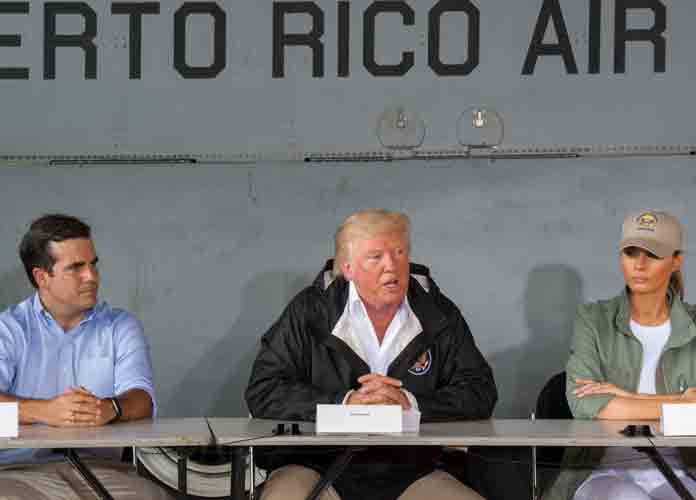

Puerto Rico Gov. Ricardo Roselló, U.S. President Donald Trump and First Lady Melania Trump discuss relief efforts during a cabinet meeting at Muñiz Air National Guard Base, Carolina, Puerto Rico, Oct. 3, 2017. The President visited Puerto Rico following Hurricane Maria and met with local leadership regarding storm response efforts. (U.S. Air National Guard photo by Staff Sgt Michelle Y. Alvarez-Rea)
Puerto Ricans voted in favor of the territory applying to be a U.S. state for the sixth time in a nonbinding referendum last month.
The U.S. territory voted 52 to 48 percent in favor of making the island commonwealth a state. The referendum marks the sixth time Puerto Ricans have voted on statehood and the third time they voted in favor of it.
The last time Puerto Ricans were polled was in 2017 when the measure won by a wide margin, but pro-independence and pro-territory groups had boycotted the vote, leading to an unimpressive 23 percent voter turnout.
“There’s no doubt that a majority of people favor statehood… This is the only issue that unites Puerto Ricans in this election when the rest of the candidates, even me, got less votes than the statehood option,” Puerto Rico Resident Commissioner Jenniffer González-Colón said Wednesday after winning a second four-year term as the island’s nonvoting House member.
Subscribe to our free weekly newsletter!
A week of political news in your in-box.
We find the news you need to know, so you don't have to.
For Washington D.C. and Puerto Rico, statehood is a highly partisan issue – with most Republicans staunchly against it, seeing it as a Democratic ploy to add more Democratic seats to U.S. Congress.
Democratic lawmakers are more supportive of making Washington D.C. a state. But support for Puerto Rico statehood still exists within both chambers – though it remains unlikely to be approved if Republicans maintain control of the Senate.
“Believe me, on D.C. and Puerto Rico — particularly if Puerto Rico votes for it, D.C. already has voted for it and wants it — [we] would love to make them states,” Senate Minority Leader Charles E. Schumer told MSNBC in September.
Senate Majority Leader Mitch McConnell opposes statehood for both, warning that statehood would eliminate filibuster rules and “pack the courts” with simple majority votes.
Sixty-one years have passed since Hawaii, the 50th state was admitted. It is the longest America has gone without adding a new state.
Former President Bill Clinton came to former President Joe Biden’s defense during an interview on…
A Republican congresswoman took a step further to promote her bill to designate President Donald…
Former White House Press Secretary Karine Jean-Pierre announced that she is leaving the Democratic Party.…
In an unexpected move, the Republican-led Senate unanimously passed the No Tax on Tips Act,…
President Donald Trump and the United States have officially accepted a Qatari gift of a…
Walmart recently announced that due to the tariffs being implemented by President Donald Trump, their…